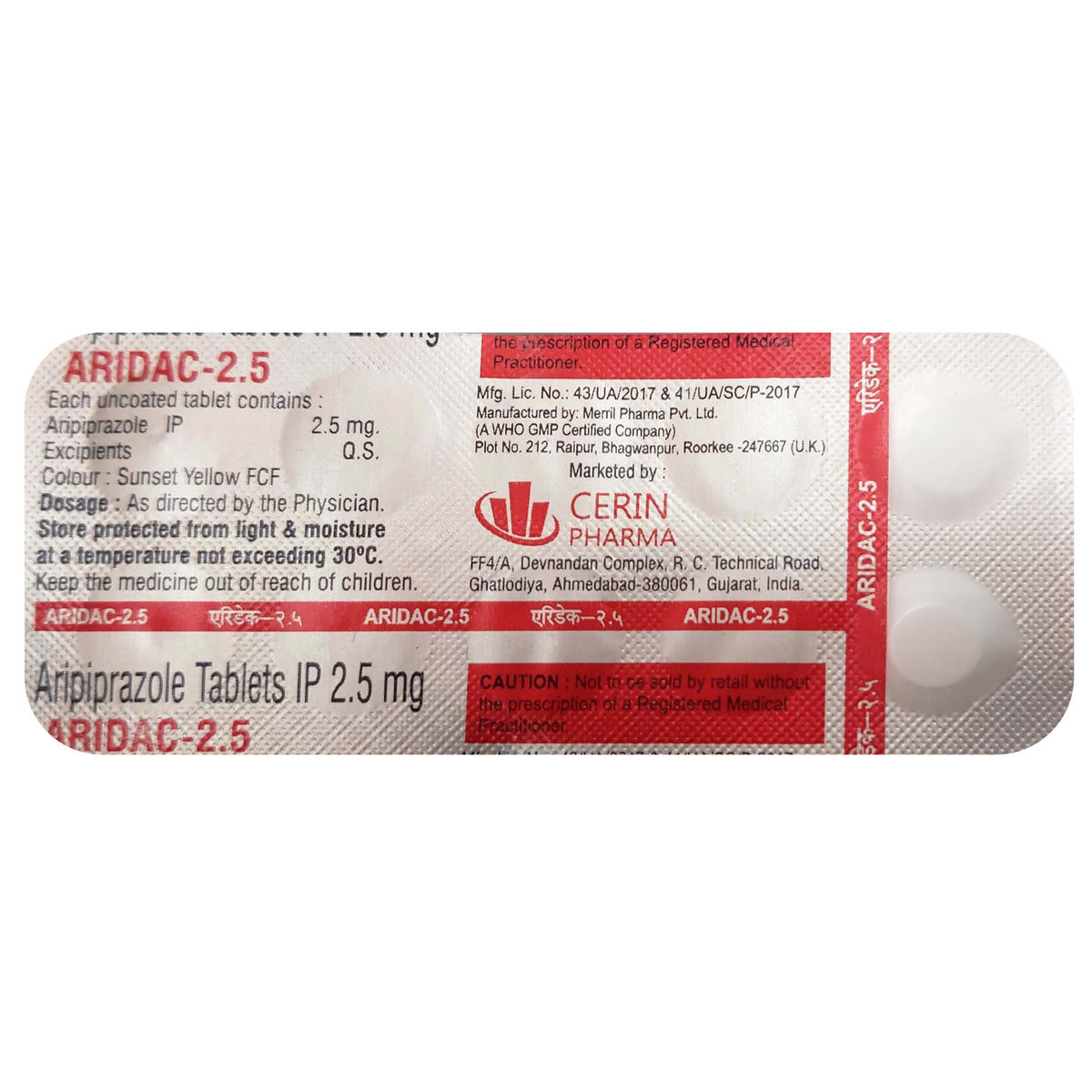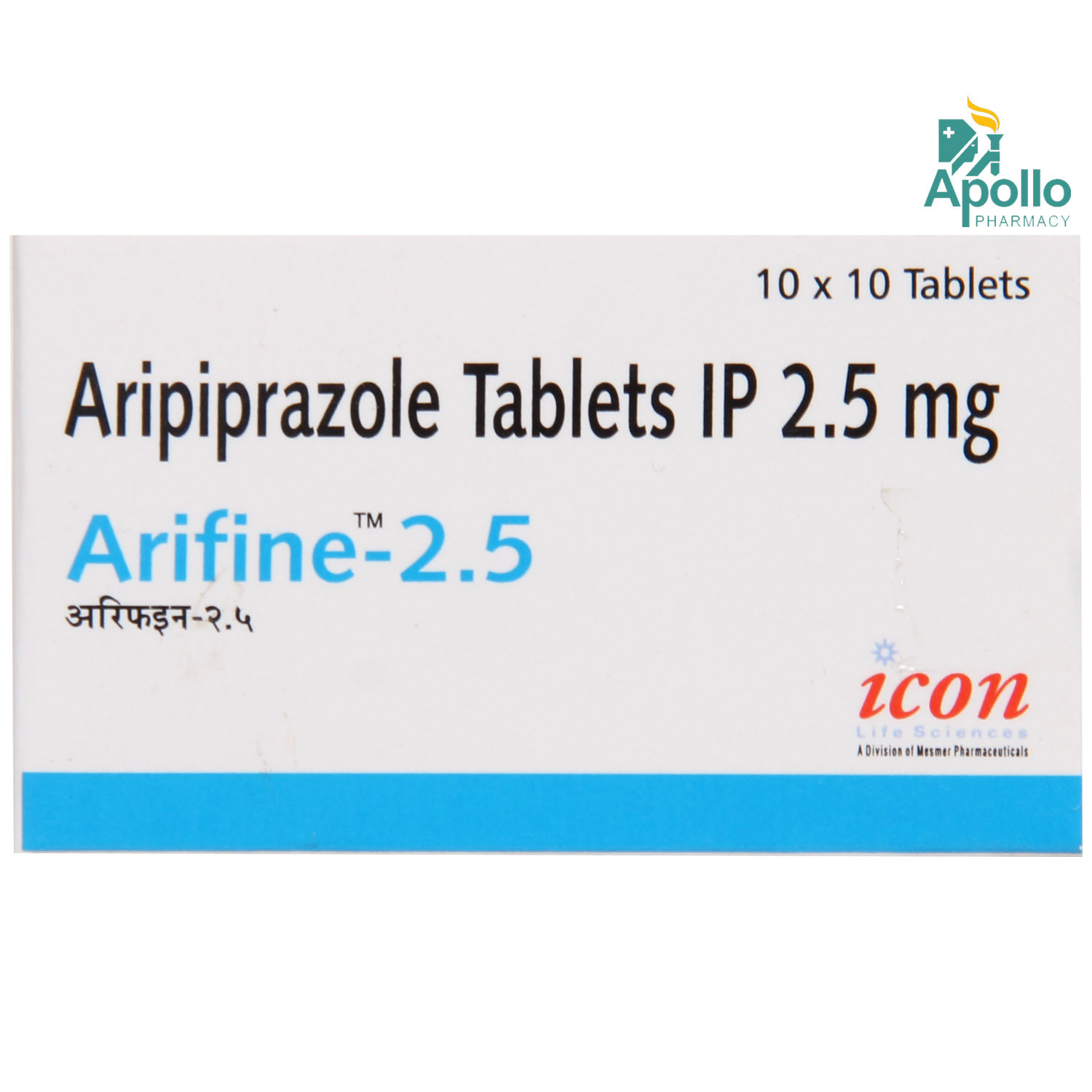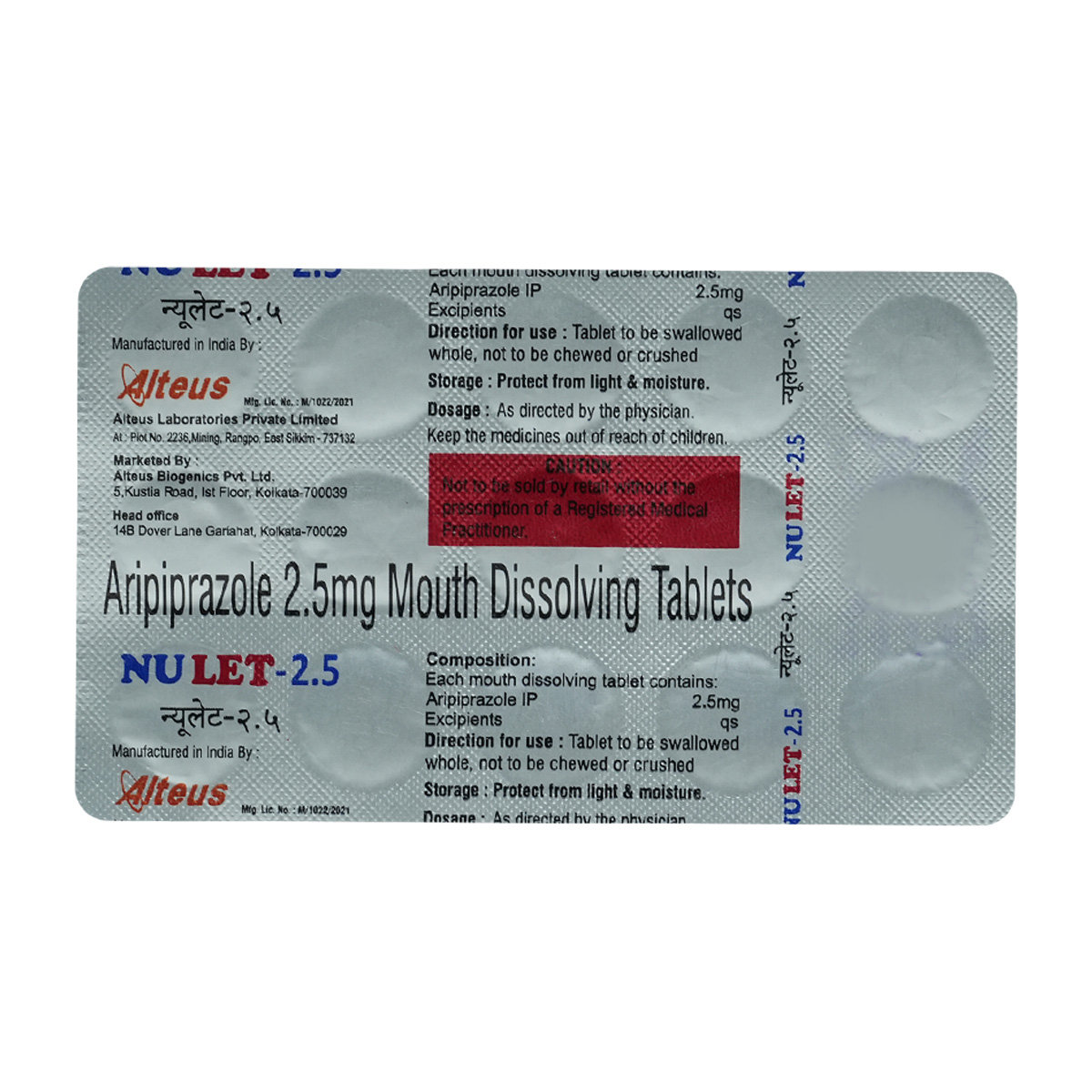Arpidon MD-2.5 Tablet 10's

(Inclusive of all Taxes)
Get Free delivery (₹99)
Arpidon MD-2.5 Tablet 10's is used to treat mood disorders like schizophrenia, irritability linked with autism, and Tourette's syndrome. Besides this, it also helps in managing mental depression along with other antidepressant medicines. It contains Aripiprazole, which stabilizes and blocks the dopamine and serotonin receptors in the brain, preventing their overactivity, thereby controlling the positive symptoms like hallucinations, misbeliefs, and unfriendly characteristics of schizophrenia. It improves the activity of dopamine and serotonin receptors in other areas of the brain. It helps control negative symptoms (like lack of emotion, social isolation, poor attention, and memory loss) of schizophrenia. Thus, it improves mood swings, depression, and other psychotic problems. Some people may experience drowsiness, headache, tiredness, akathisia (an inability to sit still), difficulty sleeping, lightheadedness, indigestion, shaking, blurred vision, nausea, vomiting, anxiety, and increased saliva production.
Know Your Delivery Time
Provide Delivery Location
 Prescription drug
Prescription drugWhats That

Secure Payment

India's Most Trusted Pharmacy

Genuine Products
- Eat fiber-rich foods, fruits, and vegetables, and track your food intake to monitor calorie consumption.
- Limit takeout and restaurant meals, and weigh yourself weekly to stay motivated.
- Build balanced meals, allow yourself to enjoy treats in moderation, and prioritize sleep and stress management through exercise and relaxation techniques.
- Inform your doctor about the nausea and discuss possible alternatives to the medication or adjustments to the dosage.
- Divide your daily food intake into smaller, more frequent meals to reduce nausea.
- Opt for bland, easily digestible foods like crackers, toast, plain rice, bananas, and applesauce.
- Avoid certain foods that can trigger nausea, such as fatty, greasy, spicy, and smelly foods.
- Drink plenty of fluids, such as water, clear broth, or electrolyte-rich beverages like coconut water or sports drinks.
- Use ginger (tea, ale, or candies) to help relieve nausea.
- Get adequate rest and also avoid strenuous activities that can worsen nausea.
- Talk to your doctor about taking anti-nausea medication if your nausea is severe.
- Record when your nausea occurs, what triggers it, and what provides relief to help you identify patterns and manage your symptoms more effectively.
- Preventing Vomiting (Before it Happens)
- Take medication exactly as prescribed by your doctor. This can help minimize side effects, including vomiting.
- Having a small meal before taking your medication can help reduce nausea and vomiting.
- Talk to your doctor about taking anti-nausea medication along with your prescribed medication.
- Managing Vomiting (If it Happens)
- Try taking ginger in the form of tea, ale, or candy to help alleviate nausea and vomiting.
- What to Do if Vomiting Persists
- Consult your doctor if vomiting continues or worsens, consult the doctor for guidance on adjusting your medication or additional treatment.
- Inform your doctor about your constipation symptoms. They may adjust your medication or advise alternative treatments.
- Stay hydrated by drinking sufficient of water (at least 8-10 glasses a day) to help soften stool and promote bowel movements.
- Increase fibre intake by eating foods high in fibre, such as fruits, whole grains, vegetables and legumes, to help bulk up the stool.
- Establish a bowel routine by trying to go to the bathroom at the same time each day to train your bowels.
- Engaging in regular exercise, like walking or yoga, can support in bowel movement stimulation.
- Consult your doctor if constipation persists, and discuss alternative treatments or adjustments to your medication.
- Restlessness is related to mental health and needs medical attention if it's severe.
- Regular practice of meditation and yoga can help calm your mind. This can reduce restlessness.
- Prevent smoking as it can impact your calmness of body and mind.
- Talk to your friends and family about restlessness, who can provide a solution for why you feel restless.
- Get sufficient sleep for a minimum of 6-7 hours to reduce restlessness.
- Stretching and walking are examples of mild exercises that can improve mobility and reduce muscle stiffness.
- Improving posture, mobility, and muscle coordination through physical therapy can help manage slowness or stiffness.
- Maintain healthy weight and advance general health depend on eating a balanced diet.
- Reducing symptoms like tremors or muscle spasms requires adequate sleep and rest.
- Notify your doctor immediately if you experience tremors or involuntary shaking after taking medication or adjusting your medication regimen.
- Your doctor may adjust your medication regimen or recommend alternative techniques like relaxation, meditation, or journaling to alleviate tremor symptoms.
- Your doctor may direct you to practice stress-reducing techniques, such as deep breathing exercises, yoga, or journaling.
- Regular physical activity, such as walking or jogging, can help reduce anxiety and alleviate tremor symptoms.
- Your doctor may recommend lifestyle changes, such as avoiding caffeine, getting enough sleep, and staying hydrated, to help manage tremors.
- Maintain regular follow-up appointments with your doctor to monitor tremor symptoms and adjust treatment plans as needed.
Drug-Drug Interactions
Drug-Drug Interactions
Login/Sign Up
Co-administration of Metoclopramide with Arpidon MD-2.5 Tablet can increase the risk of side effects.
How to manage the interaction:
Taking Arpidon MD-2.5 Tablet with Metoclopramide is generally avoided as it can result in an interaction, it can be taken if a doctor has advised it. Do not discontinue any medications without consulting a doctor.
Topiramate can cause increased body temperature and decreased sweating, and these effects may be worsened when combined with medications like Arpidon MD-2.5 Tablet.
How to manage the interaction:
Co-administration of Arpidon MD-2.5 Tablet with Topiramate can result in an interaction, but it can be taken if a doctor has advised it. However, if you experience drowsiness, dizziness, or lightheadedness, consult the doctor immediately. Avoid tasks that need mental attention, such as driving or operating dangerous machinery. Drink plenty of water when it's hot out and while you're exercising, and get medical assistance if you have reduced sweating or a fever. Do not discontinue any medications without consulting a doctor.
Combining Arpidon MD-2.5 Tablet with Mirabegron can increase the levels of Arpidon MD-2.5 Tablet in the body. This can lead to increased risk or severity of side effects.
How to manage the interaction:
Although taking Mirabegron and Arpidon MD-2.5 Tablet together can cause an interaction, it can be taken if a doctor has suggested it. If you notice any of these signs like feeling sleepy, having seizures, unusual muscle movements, low blood pressure, feeling confused, muscle spasms, twitching in your jaw, shaking or jerking in your arms and legs, feeling nervous or restless, dizziness, lightheaded, or fainting contact the doctor right away. Do not stop using any medications without a doctor's advice.
When buprenorphine is used with Arpidon MD-2.5 Tablet, it may possibly lead to significant adverse effects such as respiratory distress, unconsciousness.
How to manage the interaction:
Co-administration of buprenorphine alongside Arpidon MD-2.5 Tablet can result in an interaction, it can be taken if a doctor has advised it. Do not exceed the doses, frequency, or duration of usage advised by a doctor. You should avoid driving or operating hazardous machinery. Do not discontinue any medications without consulting a doctor.
Coadministration of Arpidon MD-2.5 Tablet and Metrizamide may increase the risk of seizure (a sudden, violent, uncontrollable contraction of a group of muscles).
How to manage the interaction:
Although taking Arpidon MD-2.5 Tablet and Metrizamide together can cause an interaction, it can be taken if a doctor has suggested it. If you have seizures or a head injury, it's important to contact a doctor right away. Don't hesitate to reach out if you're experiencing any of these symptoms. Do not discontinue any medications without consulting a doctor.
Using Esketamine together with Arpidon MD-2.5 Tablet may increase side effects (drowsiness, confusion, difficulty concentrating, and impairment in thinking, judgment, reaction speed, and motor coordination).
How to manage the interaction:
Taking Arpidon MD-2.5 Tablet with Esketamine together can result in an interaction, but it can be taken if a doctor has advised it. If you're having any of these symptoms like feeling sleepy, having trouble concentrating, or feeling confused, it's important to let your doctor know right away. They may be able to recommend other options for you that won't cause these problems. Do not stop using any medications without talking to a doctor.
Using Arpidon MD-2.5 Tablet together with Oxycodone can cause central nervous system depression (a physiological state that can result in a decreased rate of breathing, decreased heart rate, and loss of consciousness).
How to manage the interaction:
Taking Arpidon MD-2.5 Tablet with Oxycodone together can result in an interaction, but it can be taken if a doctor has advised it. Do not exceed the doses, frequency, or duration of usage advised by a doctor. Furthermore, because these medications may induce dizziness, sleepiness, trouble focusing, and impairment in judgement, response speed, and motor coordination, you should avoid driving or operating dangerous machinery. Do not stop using any medications without a doctor's advice.
Using Arpidon MD-2.5 Tablet together with Remifentanil can cause central nervous system depression (a physiological state that can result in a decreased rate of breathing, decreased heart rate, and loss of consciousness).
How to manage the interaction:
There may be a possibility of interaction between Arpidon MD-2.5 Tablet and Remifentanil, but it can be taken if prescribed by a doctor. It's important to keep an eye on your health and talk to a doctor about any concerns. If you notice any symptoms like trouble breathing, feeling sleepy or dizzy, or having trouble focusing, make sure to contact a doctor right away. Do not stop using any medications without talking to a doctor.
Using Arpidon MD-2.5 Tablet together with Butorphanol can cause central nervous system depression (a physiological state that can result in a decreased rate of breathing, decreased heart rate, and loss of consciousness).
How to manage the interaction:
Co-administration of Arpidon MD-2.5 Tablet with Sufentanil can result in an interaction, but it can be taken if a doctor has advised it. It's important to keep an eye on your health and talk to a doctor about any concerns. If you notice any of these symptoms - trouble breathing, feeling too sleepy or dizzy, having trouble focusing - make sure to call a doctor right away. Do not stop using any medications without talking to a doctor.
Phenytoin may decrease the blood levels of Arpidon MD-2.5 Tablet, which may make Arpidon MD-2.5 Tablet less effective in treating the condition.
How to manage the interaction:
Although taking Phenytoin and Arpidon MD-2.5 Tablet together can result in an interaction, it can be taken if a doctor has prescribed it. Do not stop using any medications without a doctor's advice.
Drug-Food Interactions
Drug-Food Interactions
Login/Sign Up
Product Substitutes

Have a query?
FAQs
Disclaimer
Author Details
We provide you with authentic, trustworthy and relevant information
Buy best C.n.s Drugs products by
Intas Pharmaceuticals Ltd
Sun Pharmaceutical Industries Ltd
Torrent Pharmaceuticals Ltd
Alkem Laboratories Ltd
Abbott India Ltd
Alteus Biogenics Pvt Ltd
Cipla Ltd
Micro Labs Ltd
Lupin Ltd
D D Pharmaceuticals Pvt Ltd
Ipca Laboratories Ltd
Tripada Healthcare Pvt Ltd
Arinna Lifesciences Ltd
Icon Life Sciences
Mankind Pharma Pvt Ltd
Linux Laboratories Pvt Ltd
East West Pharma India Pvt Ltd
Cnx Health Care Pvt Ltd
La Renon Healthcare Pvt Ltd
Talent India Pvt Ltd
Eris Life Sciences Ltd
Leeford Healthcare Ltd
Tas Med India Pvt Ltd
Emcure Pharmaceuticals Ltd
Macleods Pharmaceuticals Ltd
Consern Pharma Ltd
Zydus Healthcare Ltd
Troikaa Pharmaceuticals Ltd
Dr Reddy's Laboratories Ltd
Jagsam Pharma
Sigmund Promedica
Aristo Pharmaceuticals Pvt Ltd
Ardent Life Sciences Pvt Ltd
Zydus Cadila
Ikon Pharmaceuticals Pvt Ltd
Matias Healthcare Pvt Ltd
Shine Pharmaceuticals Ltd
Wockhardt Ltd
Theo Pharma Pvt Ltd
Propel Healthcare
Crescent Formulations Pvt Ltd
Lifecare Neuro Products Ltd
Reliance Formulation Pvt Ltd
Matteo Health Care Pvt Ltd
Mesmer Pharmaceuticals
Morepen Laboratories Ltd
Ajanta Pharma Ltd
Neon Laboratories Ltd
Capital Pharma
Med Manor Organics Pvt Ltd
Lyf Healthcare
Msn Laboratories Pvt Ltd
Sanix Formulation Pvt Ltd
Akumentis Healthcare Ltd
Pulse Pharmaceuticals
Brainwave Healthcare Pvt Ltd
Sanofi India Ltd
Solvate Laboratories Pvt Ltd
Cyrus Remedies Pvt Ltd
Elder Pharmaceuticals Ltd
Hetero Healthcare Pvt Ltd
Psyco Remedies Ltd
Medishri Healthcare Pvt Ltd
Alniche Life Sciences Pvt Ltd
Novartis India Ltd
Crescent Therapeutics Ltd
Hbc Life Sciences Pvt Ltd
Mova Pharmaceutical Pvt Ltd
Cadila Healthcare Ltd
Tripada Lifecare Pvt Ltd
Talin Remedies Pvt Ltd
Prevego Healthcare & Research Pvt Ltd
Serotonin Pharmaceuticals Llp
Solis Pharmaceuticals
Alembic Pharmaceuticals Ltd
Glenmark Pharmaceuticals Ltd
Infivis Life Care
Kivi Labs Ltd
Quince Lifesciences Pvt Ltd
Trion Pharma India Llp
Gagnant Healthcare Pvt Ltd
A N Pharmacia Laboratories Pvt Ltd
Primus Remedies Pvt Ltd
Crescent Pharmaceuticals
Glarizonto Pharma Pvt Ltd
Knoll Healthcare Pvt Ltd
Lia Life Sciences Pvt Ltd
Lyceum Life Sciences Pvt Ltd
Medopharm Pvt Ltd
Vasu Organics Pvt Ltd
Wallace Pharmaceuticals Pvt Ltd
Zuventus Healthcare Ltd
Arches Pharmaceuticals
Blue Cross Laboratories Pvt Ltd
Cadila Pharmaceuticals Ltd
Corona Remedies Pvt Ltd
Glial Life Science Llp
Lincoln Pharmaceuticals Ltd
Maneesh Pharmaceuticals Ltd
USV Pvt Ltd



















